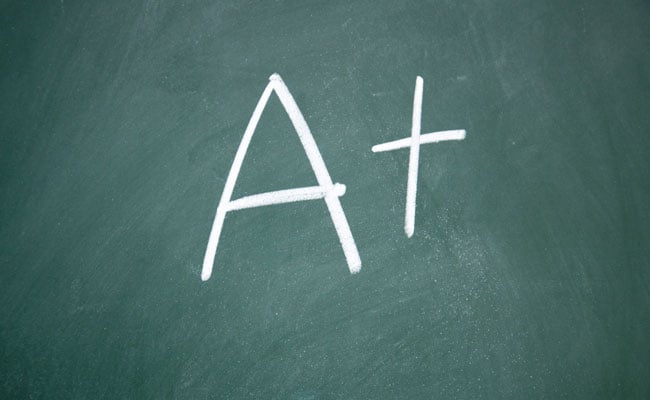
The Downside Of India's Obsession With Good Grades
New Delhi:
What does academic success look like? How does a successful career look like? While there is no definite answer, in India, academic success is mostly associated with marks. It is a widely held belief that those who score more end up having an illustrious career later in life. But is it the right approach and does scoring more ensures a successful career?
Forbes recently published an article wherein it quoted Eric Barker whose book 'Barking Up The Wrong Tree: The Surprising Science Behind Why Everything You Know About Success Is (Mostly) Wrong' which was released recently. Eric Barker, in an excerpt from his book, wrote for Times, that students who graduate with top grades from high school do well but rarely rise to their full potential and contribute any path-breaking innovation or paradigm shift in the society.
The hypothesis holds true for Indian education system as well, where students who abide by the rules are rewarded leaving little scope for thinking out of the box.
The Forbes article quotes Eric Barker, "So why are the number ones in high school so rarely the number ones in real life? There are two reasons. First, schools reward students who consistently do what they are told. Academic grades correlate only loosely with intelligence (standardized tests are better at measuring IQ). Grades are, however, an excellent predictor of self-discipline, conscientiousness, and the ability to comply with rules. The second reason is that schools reward being a generalist. There is little recognition of student passion or expertise."
An article on Grades on the Cambridge University's 'The Success-Failure Project' website cites Boston University Professor Ellen Ruppel Shell saying, "GPA is a noisome construct, and misleading. . . an indication of far less than we believe it to be."
Indian Education System and its emphasis on Good Grades
 Good grades or percentage are the driving force of education system in India
Good grades or percentage are the driving force of education system in India
The high importance attested to good grades, in India, gives rise to the idea that memorization and rote-learning is more rewarding. However, this kind of learning leads to zero to negligible learning of skills which lead to innovation and out of the box discoveries. Add to this the social stigma attached with low marks and with studying certain disciplines such as humanities as opposed to highly valued courses such as engineering and the students in the age group of 16-25 in India have a hard time coping with academic pressure.
The importance attached to grades and percentage is very much apparent by the selection methodology adopted by many universities for admission to degree courses. We are not talking about the institutes which select students on the basis of their performance in an entrance examination, but the likes of University of Delhi and University of Mumbai. The admission to degree courses in most of the universities in the country is based on cut offs.
In the past decade, the cut offs for many courses have risen to more than 99% making it more difficult for those who score average marks to get admission in a good college. The race to get admission in a good college with good infrastructure and faculty is another reason for the pressure to get good marks.
Academic Pressure Leads to Stress Related Mental Health Problems
 Students suffer from anxiety, depression and other stress-related disorders
Students suffer from anxiety, depression and other stress-related disorders
Unchecked stress related to academics can lead to severe mental health problems. As per the statistics released by National Crime Records Bureau (NCRB) for the year 2015, almost 8952 students committed suicide in India. Of the total suicides in India in 2015, 2% of the total was cited as due to failure in examination. The pressure to do well in examination or perform well academically is often times too much for students. The cases of depression among students have also been on a rise in India.
Indian education system also lacks a comprehensive counselling network to help students cope with academic pressure. Though certain education boards have made it compulsory for schools to have a guidance counselor on campus, however, the mandate is hardly being followed everywhere. Some premier institutes like IITs have also set up Student Wellness Centres on campus. But again, the practice seems to be restricted to a handful of institutes.
The stigma attached to mental health is another reason which often prohibits a student from seeking help. The stigma, obviously, would take time before it disappears but to India would need to take steps to that end which could include better mental healthcare facilities at not just private clinics but at government clinics and hospitals too, compulsory counselling facility for school and college students, state sponsored awareness program etc.
India certainly needs to asses it's preference for good grades if not for anything else then for the sake of shrugging off its reputation as one of the countries with highest youth suicide rate in the world.
(This article was originally published on August 10, 2017. The article was revised on November 9, 2017.)
Click here for more Education News
Forbes recently published an article wherein it quoted Eric Barker whose book 'Barking Up The Wrong Tree: The Surprising Science Behind Why Everything You Know About Success Is (Mostly) Wrong' which was released recently. Eric Barker, in an excerpt from his book, wrote for Times, that students who graduate with top grades from high school do well but rarely rise to their full potential and contribute any path-breaking innovation or paradigm shift in the society.
The hypothesis holds true for Indian education system as well, where students who abide by the rules are rewarded leaving little scope for thinking out of the box.
The Forbes article quotes Eric Barker, "So why are the number ones in high school so rarely the number ones in real life? There are two reasons. First, schools reward students who consistently do what they are told. Academic grades correlate only loosely with intelligence (standardized tests are better at measuring IQ). Grades are, however, an excellent predictor of self-discipline, conscientiousness, and the ability to comply with rules. The second reason is that schools reward being a generalist. There is little recognition of student passion or expertise."
An article on Grades on the Cambridge University's 'The Success-Failure Project' website cites Boston University Professor Ellen Ruppel Shell saying, "GPA is a noisome construct, and misleading. . . an indication of far less than we believe it to be."
Indian Education System and its emphasis on Good Grades

The high importance attested to good grades, in India, gives rise to the idea that memorization and rote-learning is more rewarding. However, this kind of learning leads to zero to negligible learning of skills which lead to innovation and out of the box discoveries. Add to this the social stigma attached with low marks and with studying certain disciplines such as humanities as opposed to highly valued courses such as engineering and the students in the age group of 16-25 in India have a hard time coping with academic pressure.
The importance attached to grades and percentage is very much apparent by the selection methodology adopted by many universities for admission to degree courses. We are not talking about the institutes which select students on the basis of their performance in an entrance examination, but the likes of University of Delhi and University of Mumbai. The admission to degree courses in most of the universities in the country is based on cut offs.
In the past decade, the cut offs for many courses have risen to more than 99% making it more difficult for those who score average marks to get admission in a good college. The race to get admission in a good college with good infrastructure and faculty is another reason for the pressure to get good marks.
Academic Pressure Leads to Stress Related Mental Health Problems

Unchecked stress related to academics can lead to severe mental health problems. As per the statistics released by National Crime Records Bureau (NCRB) for the year 2015, almost 8952 students committed suicide in India. Of the total suicides in India in 2015, 2% of the total was cited as due to failure in examination. The pressure to do well in examination or perform well academically is often times too much for students. The cases of depression among students have also been on a rise in India.
Indian education system also lacks a comprehensive counselling network to help students cope with academic pressure. Though certain education boards have made it compulsory for schools to have a guidance counselor on campus, however, the mandate is hardly being followed everywhere. Some premier institutes like IITs have also set up Student Wellness Centres on campus. But again, the practice seems to be restricted to a handful of institutes.
The stigma attached to mental health is another reason which often prohibits a student from seeking help. The stigma, obviously, would take time before it disappears but to India would need to take steps to that end which could include better mental healthcare facilities at not just private clinics but at government clinics and hospitals too, compulsory counselling facility for school and college students, state sponsored awareness program etc.
India certainly needs to asses it's preference for good grades if not for anything else then for the sake of shrugging off its reputation as one of the countries with highest youth suicide rate in the world.
(This article was originally published on August 10, 2017. The article was revised on November 9, 2017.)
Click here for more Education News
